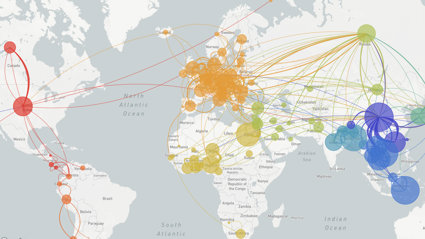
Professor John Hessler
John Hessler is an applied mathematician, Geographic Information Systems (GIS) scientist, and lecturer at Johns Hopkins University, specializing in geospatial modeling and mapping the transmission of zoonotic diseases and the movement of their animal hosts.
He is the director of the biomap-lab, where their present research centers on mapping the complex transmission pathways of the 2014-2016 Ebola virus outbreak in West Africa, and on tracing the movement of avian H5N1 influenza in migrating bird and mammal populations, using fluid-flow type models.
An affiliated researcher at the Data Science & AI Institute at Johns Hopkins, his theoretical research concentrates on the development of machine learning algorithms for spatial epidemiology, on the mathematics of Bayesian and Markov Random Field disease mapping techniques, and on computational approaches to the uncertain geographic context problem.
Formerly a specialist in computational geography and geographic information science at the Library of Congress, he has provided policy analysis to members of Congress, staff and committees on a wide range of complex and computationally intractable issues, like congressional redistricting, the SARS-CoV-2 pandemic, and the use differential privacy algorithms by the US Census.
The author or editor of more than one hundred articles and books, including the New York Times bestseller, MAP: Exploring the World, he is now trying to turn a mess of mathematical course notes into the forthcoming book, Lectures on Mereotopology and the Ontological Foundations of Geographic Information Science.
He finds being close to the gentle hum of supercomputers, pondering the complex labyrinths of renormalization group theory, and exploring the philosophical knots of evolutionary algorithms, strangely comforting.